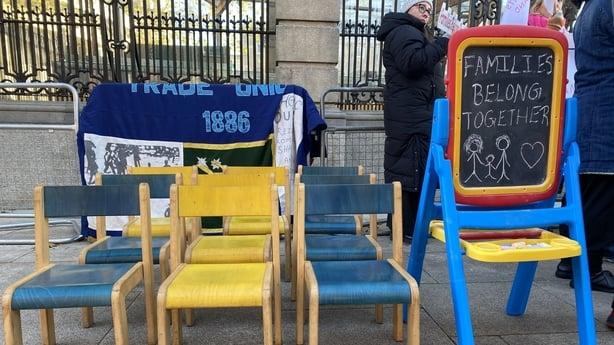News / National
Zimbabwean migrant workers' families separated by Ireland reunification policy
22 Nov 2025 at 14:46hrs |
643 Views

Bethal Muzaya, who arrived in Ireland three years ago to work as a healthcare assistant, is facing a prolonged and distressing wait to reunite with her family. Under the General Employment Permit, she secured accommodation and began working with autistic children. After a year, she applied for a family reunification visa for her husband and two children, but her application was denied, prompting her to lodge an appeal. She has now been waiting 18 months for a decision.
Tragedy struck in August when Ms. Muzaya received news that her husband had died suddenly in Zimbabwe, leaving her children without a surviving parent. Speaking about her ordeal, she said, "I don't know what to do anymore, my kids are back home, they need me, I need them and now that they've lost their father, I'm the only surviving parent."
Unlike those holding Critical Skills Employment Permits, workers like Ms. Muzaya face lengthy delays for family reunification, even when they have stable employment and housing.
The issue was highlighted at a rally outside Leinster House on Thursday, organised by Migrant Rights Centre Ireland to protest the inequities between permit categories. Angelina Nyoni, a support worker from County Cavan, shared her own struggles, having spent her 50th birthday alone, separated from her partner and 12-year-old son. She has also had her family reunification application rejected and is still awaiting a response to her appeal.
Nyoni described the emotional toll of separation: "You don't know what it means to go home to an empty house. You cry in bed. You cry on your way to work, and then you get to work and you do your best, you get home again, and cry yourself to sleep." She added that working with children who sometimes call her "mum" has been especially painful.
Dave Gibney, campaigns coordinator at Migrant Rights Centre Ireland, argued that the policy is economically and socially illogical. "Employers who hire the workers want the policy changed and workers also want the policy changed… migrant workers already contribute hundreds of millions of euro in taxes. If they were allowed to bring their spouses in, those spouses would also work, which would mean hundreds of millions more," he said.
Income thresholds for family reunification further complicate matters for healthcare workers. To bring one child, a migrant must earn €36,000, and for two children, €42,000 - well above the typical healthcare worker salary of €30,000 - €33,000.
The Department of Justice confirmed that two reviews are underway: one examining the policy for non-EEA family reunification, last amended in 2016, and another reviewing provisions for people granted International Protection in the context of EU migration reforms. A spokesperson noted that Minister for Justice Jim O'Callaghan will present both reviews to Cabinet next week.
For Ms. Muzaya, Nyoni, and other migrant workers, these changes cannot come soon enough, as families remain separated and vulnerable while waiting for an often slow and opaque system to deliver justice.
Tragedy struck in August when Ms. Muzaya received news that her husband had died suddenly in Zimbabwe, leaving her children without a surviving parent. Speaking about her ordeal, she said, "I don't know what to do anymore, my kids are back home, they need me, I need them and now that they've lost their father, I'm the only surviving parent."
Unlike those holding Critical Skills Employment Permits, workers like Ms. Muzaya face lengthy delays for family reunification, even when they have stable employment and housing.
The issue was highlighted at a rally outside Leinster House on Thursday, organised by Migrant Rights Centre Ireland to protest the inequities between permit categories. Angelina Nyoni, a support worker from County Cavan, shared her own struggles, having spent her 50th birthday alone, separated from her partner and 12-year-old son. She has also had her family reunification application rejected and is still awaiting a response to her appeal.
Nyoni described the emotional toll of separation: "You don't know what it means to go home to an empty house. You cry in bed. You cry on your way to work, and then you get to work and you do your best, you get home again, and cry yourself to sleep." She added that working with children who sometimes call her "mum" has been especially painful.
Dave Gibney, campaigns coordinator at Migrant Rights Centre Ireland, argued that the policy is economically and socially illogical. "Employers who hire the workers want the policy changed and workers also want the policy changed… migrant workers already contribute hundreds of millions of euro in taxes. If they were allowed to bring their spouses in, those spouses would also work, which would mean hundreds of millions more," he said.
Income thresholds for family reunification further complicate matters for healthcare workers. To bring one child, a migrant must earn €36,000, and for two children, €42,000 - well above the typical healthcare worker salary of €30,000 - €33,000.
The Department of Justice confirmed that two reviews are underway: one examining the policy for non-EEA family reunification, last amended in 2016, and another reviewing provisions for people granted International Protection in the context of EU migration reforms. A spokesperson noted that Minister for Justice Jim O'Callaghan will present both reviews to Cabinet next week.
For Ms. Muzaya, Nyoni, and other migrant workers, these changes cannot come soon enough, as families remain separated and vulnerable while waiting for an often slow and opaque system to deliver justice.
Source - www.rte.ie
Join the discussion
Loading comments…
























